|
|
|
Sort Order |
|
|
|
Items / Page
|
|
|
|
|
|
|
| Srl | Item |
| 1 |
ID:
116497
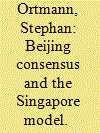

|
|
|
|
|
| Publication |
2012.
|
| Summary/Abstract |
What is today touted as the 'Beijing consensus' or the 'China model' is nothing more than a resized version of the 'Singapore model' or an attempt to revive the developmental state. In particular, the 'Beijing consensus' assumes a greater role for the state in the economy under authoritarian rule. Since Deng Xiaoping's Southern Tour in 1992, Chinese academics, politicians, and administrators have flocked to the soft-authoritarian city-state and the result has not only been a sprawling discourse but also a number of political reforms aimed at increasing the effectiveness of the state and strengthening one-party rule. An analysis of this discourse shows that while providing Chinese policy-makers with many important ideas, these studies reveal serious weaknesses in China's attempt to follow the 'Singapore model'. Instead of having found an alternative authoritarian state-capitalist model, the 'Beijing consensus' is only a transitory phase.
|
|
|
|
|
|
|
|
|
|
|
|
|
|
|
|
| 2 |
ID:
162793
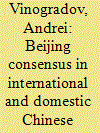

|
|
|
|
|
| Summary/Abstract |
This article examines the approaches of foreign researchers to the model of the Beijing Consensus formulated in 2004 by Joshua Cooper Ramo, including those of members of different Chinese schools of thought. We analyze the question is analyzed of whether China, in promoting the ideas of globalization, is ready to propose a realistic alternative to the Washington Consensus, or to reproduce the successful experience of its own development in other developing countries. The model of the Beijing Consensus is examined in the context of the change in global leadership.
|
|
|
|
|
|
|
|
|
|
|
|
|
|
|
|
| 3 |
ID:
119258
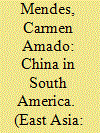

|
|
|
|
|
| Publication |
2013.
|
| Summary/Abstract |
The growing presence of the People's Republic of China (PRC) in South America highlights its domestic priorities. On the economic side, high levels of development, source of political stability and international recognition, exacerbate the need of importing natural resources and exporting manufactured products. Politically, the policy of national reunification, which is also an important provider of stability drawn from nationalism, demand strengthening relations with countries in areas attracted by Taiwan, isolating the island in the international arena. Beijing is actively working to increase its political leverage and shape the agenda of international politics giving South-South cooperation a strategic dimension well beyond mutual development. This fits South American objectives, namely the ones of Brazil, Argentina and Venezuela, that aim at diversifying international partnerships and perceive China as an alternative to the traditional orientation towards Latin America, the US and Europe. Positioning itself as a stakeholder, China creates the basis for an alternative international order using persuasion. The Chinese soft power in South America may be a drop of water in a much broader strategy.
|
|
|
|
|
|
|
|
|
|
|
|
|
|
|
|
| 4 |
ID:
147538
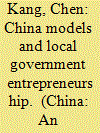

|
|
|
|
|
| Summary/Abstract |
In recent years, the “China model” of development has been proposed and promoted. Some proponents of the China model even suggest that there emerges a “Beijing Consensus” which has a high possibility of replacing the Washington Consensus. This article argues that there exist at least two China models, which have contrasting features with distinctive roles played by entrepreneurs within China’s local governments. In the earlier years of the reform era, the role of market was expanding, and local governments mainly played an enabling role in facilitating the growth of non-state sectors and in following the demand-driven growth path to expand local tax bases under the revenue-sharing system. After 1998 onwards, the current government-led investment-driven development model gradually emerged with local governments’ focus evidently shifting towards rent-seeking and monopolising financial resources for their own investment projects. The article discusses the incentive compatibility issues associated with local governments under the two China models and documents in detail local governments’ entrepreneurship in investment financing.
|
|
|
|
|
|
|
|
|
|
|
|
|
|
|
|
| 5 |
ID:
093954
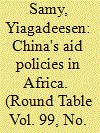

|
|
|
|
|
| Publication |
2010.
|
| Summary/Abstract |
Since the Beijing Summit of the Forum on China-Africa Co-operation in 2006, China's renewed interest in Africa has garnered a lot of attention and generated a lot of debate. Western media and analysts have, perhaps not surprisingly, been generally very critical of China's rising influence in Africa. The African reaction, however, has been more mixed. African leaders have welcomed what they see as a new approach to development and increased potential for meaningful South-South co-operation. African civil society groups have been more cautious and are worried about the possible negative repercussions on governance, the environment, human rights and overall economic development. This paper focuses on Chinese foreign aid to Africa and discusses the opportunities and challenges that it presents for China, the African continent, and the international community. This allows the uncovering of many misconceptions regarding the potential impact (whether positive or negative) of this renewed interest by different parties. The paper argues that if one adopts an approach that puts ordinary Africans first, at the centre of development, then the only option available to us is to engage China in a constructive partnership in order to make its aid effective.
|
|
|
|
|
|
|
|
|
|
|
|
|
|
|
|
| 6 |
ID:
095537
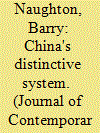

|
|
|
|
|
| Publication |
2010.
|
| Summary/Abstract |
The idea of the 'Beijing Consensus' does not accurately describe what has happened in China, nor does it represent a consensus among Chinese economists and policy-makers. This article presents six distinctive features of China's economic development, and argues that while each provides important lessons, none are easily copied by other developing countries. The intertwining of state and market in China is at the root of China's most distinctive developmental features. However, the specific character of the Chinese system and the way in which government and business relations have been structured cannot be readily replicated in other countries.
|
|
|
|
|
|
|
|
|
|
|
|
|
|
|
|
| 7 |
ID:
142546
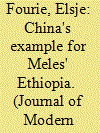

|
|
|
|
|
| Summary/Abstract |
The past decade has seen the rapid rise of concepts such as the ‘China Model’ and the ‘Beijing Consensus’, yet more recent trends suggest a waning of their popularity. This article finds that the problem with the literature on the China model lies less with the concept itself than with a tendency to apply the term in an atheoretical and unempirical manner. From 2005 until at least 2012, Ethiopian elites from the upper echelons downwards were indeed engaged in a conscious and voluntary attempt to emulate aspects of China's perceived developmental successes. Drawing on interviews with 46 such elites, as well as on theories of lesson-drawing and cross-societal emulation, the study suggests that China may act as an example to countries seeking to achieve rapid modernisation and to navigate the perilous waters of political and economic globalisation. It is only by historicising and contextualising the ‘China Model’ within the older story of selective incorporation by certain ‘latecomer’ countries, however, that its true influence – and limits – can be understood.
|
|
|
|
|
|
|
|
|
|
|
|
|
|
|
|
| 8 |
ID:
082798
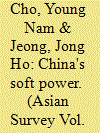

|
|
|
|
|
| Publication |
2008.
|
| Summary/Abstract |
This article analyzes discussions, resources, and prospects for soft power in China, focusing on the Beijing Consensus, foreign policy, and civilization. It posits that the country's recognition of soft power and its application to national policies is an important factor in explaining China's rapidly increasing influence in Asia.
|
|
|
|
|
|
|
|
|
|
|
|
|
|
|
|
| 9 |
ID:
137498
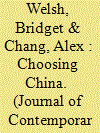

|
|
|
|
|
| Summary/Abstract |
This article examines East Asians and Chinese nationals who select ‘China as a model’ of development. The analysis looks at both macro and micro explanations to show that China's standing as a development model is not in sync with its status as a rising global and regional power. At the macro level, the focus is on country-level patterns, while the micro analysis is drawn from the third wave surveys of the Asia Barometer Survey data conducted from 2011 to 2013 in 13 different countries. The findings suggest that political values, history, geography and socio-economic conditions correspond to different views of China as a model and that those outside of China who select the country as a model are quite different from those in China itself.
|
|
|
|
|
|
|
|
|
|
|
|
|
|
|
|
| 10 |
ID:
131820
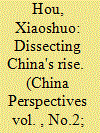

|
|
|
|
|
| Publication |
2014.
|
| Summary/Abstract |
The recent discussion of a "Beijing Consensus" and a China model seems to challenge neoliberalism as the dominating discourse on development. This paper attempts to explain the contradictions in China's development and discusses whether and how they can be redressed. Specifically, the paper analyses the key issues around the debate over the China model - how distinctive it is and whether it can be replicated elsewhere, and what real lessons can be drawn from China's rise. It proposes a more nuanced view of the economic, social, and political structures in China with a focus on its mixed economy, the role of the state at both the central and local levels, and the possibility of Chinese-style democracy. It also offers suggestions for improving the China model.
|
|
|
|
|
|
|
|
|
|
|
|
|
|
|
|
| 11 |
ID:
077281
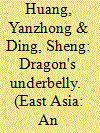

|
|
|
| 12 |
ID:
095201
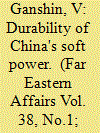

|
|
|
|
|
| Publication |
2010.
|
| Summary/Abstract |
After successfully hosting the Olympic Games, it seems as though China now finds itself in a new process of self-identification. With the proliferation of crisis situations globally, China's earlier status and weight in international affairs could hardly serve to strengthen its international positions. Meanwhile, Beijing states resolutely that it will never become a "superpower," and that its ascent and marshalling of might presents no threat whatsoever to other members of the world community. China intends to conquer its new heights by exclusively peaceful means, with the help of so-called soft power. To accomplish this, it is ready in the future to seek mutual understanding with other nations and peoples through increased cultural exchanges, promoting the attractiveness of its model of socioeconomic development, and convincing others of its sincerity.
|
|
|
|
|
|
|
|
|
|
|
|
|
|
|
|
| 13 |
ID:
095538
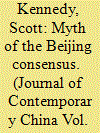

|
|
|
|
|
| Publication |
2010.
|
| Summary/Abstract |
The widely touted concept of the 'Beijing Consensus' (BC) suggests that China's economic success violates conventional theories of development and offers developing countries an alternative vision to the Washington Consensus (WC). Although ambitious, the original conception of the BC is not up to the task of being a worthwhile competitor to the alternative model from which its name was coined, not because of the WC's apparent worthiness, but rather because the BC is a misguided and inaccurate summary of China's actual reform experience. It not only gets the empirical facts wrong about China, it also disregards the similarities and differences China's experience shares with other countries, and it distorts China's place in international politics. In spite of these weaknesses, the BC is nevertheless a useful touchstone to consider the evolution of developmental paradigms, compare China's experience with that of others, identify the most distinctive features of China's experience, and evaluate its significance for the development prospects of other countries and for international relations.
|
|
|
|
|
|
|
|
|
|
|
|
|
|
|
|
| 14 |
ID:
106006
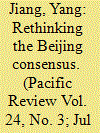

|
|
|
|
|
| Publication |
2011.
|
| Summary/Abstract |
This paper discusses the role of the Beijing Consensus type of foreign and economic policymaking in China's development since the Asian financial crisis and in its response to the global crisis, and argues that it has been a double-edged sword, as reflected in several aspects. First, the lesson that China learned from the Asian financial crisis was not the importance of liberalisation but prudence or conservativeness, which despite serving as a shield this time sustains problems in the long term. Second, an obsession with foreign reserves accumulation and the pursuit of political influence have for a long time overshadowed the increasing dependence on the US market, putting China in a dilemma now in both development and diplomatic strategies. Third, centralised decision-making may be faster than democratic processes, but it may also go against the principle of 'scientific decision' as proposed by the Chinese leadership. A prominent feature of China's responses to the crisis is a bias towards state-owned enterprises and the public sector, which exacerbates the existing problems of monopoly, over-capacity, inequality, the regulators being 'captured' by industrial interests and protectionism. Given limited economic resources, domestic political contentions and the questionable credibility of the China Model, it would be difficult for China to practice 'responsible great power' diplomacy or assume leadership in the region or globally.
|
|
|
|
|
|
|
|
|
|
|
|
|
|
|
|
| 15 |
ID:
138339
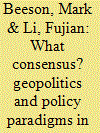

|
|
|
|
|
| Summary/Abstract |
The Washington Consensus is not what it was. A model of development associated with the Untied States, it has been diminished both by apparent failures, widespread criticism and by the recent economic crisis that had its origins in the US. Anglo-American capitalism has lost a good deal of its influence and attractiveness. As a consequence, alternative models of development have become more prominent, especially the so-called Beijing Consensus. The authors argue that at one level this evolving policy discourse and debate reflects a long-term structural change in the relative positions of China and the United States. However, it is far from clear that this transformation has gone far enough to underpin a significant ideational or policy challenge on China's part. On the contrary, the debate in China demonstrates that there is little appetite for, or expectation of, a major paradigm change in the near future.
|
|
|
|
|
|
|
|
|
|
|
|
|
|
|
|
|
|
|
|
|